It’s still dark out, the roads are as quiet as you’ll ever hear them in Bengaluru. The relative peace and quiet here is disturbed only by an energetic herd of 10 young girls. Monisha Mercelline leads this pack of girls – some barefoot, others in flip flops – to a dirt field by Sri Chamundeshari Park in Koramangala 8th Block.
Monisha is a programme coordinator at the non-profit Maarga which works with children from slums. She had woken up around 4 am to round up the girls aged between 12 and 18, visiting each of their residences.
“Initially, we used to wake them up and take them to the ground. Nowadays they get up early in the morning and give me a call, and we all go together,” Monisha says.
Leanne Cockburn and her partner Netra Srikanth meet the girls at the empty field with cones and balls. Leanne and Netra started LEOA Football Academy, which is dedicated to developing the women’s game, this April. Leanne connected with Maarga, which was then looking to partner with a non-profit to run football sessions for the kids. She has been coaching the girls since the end of June.
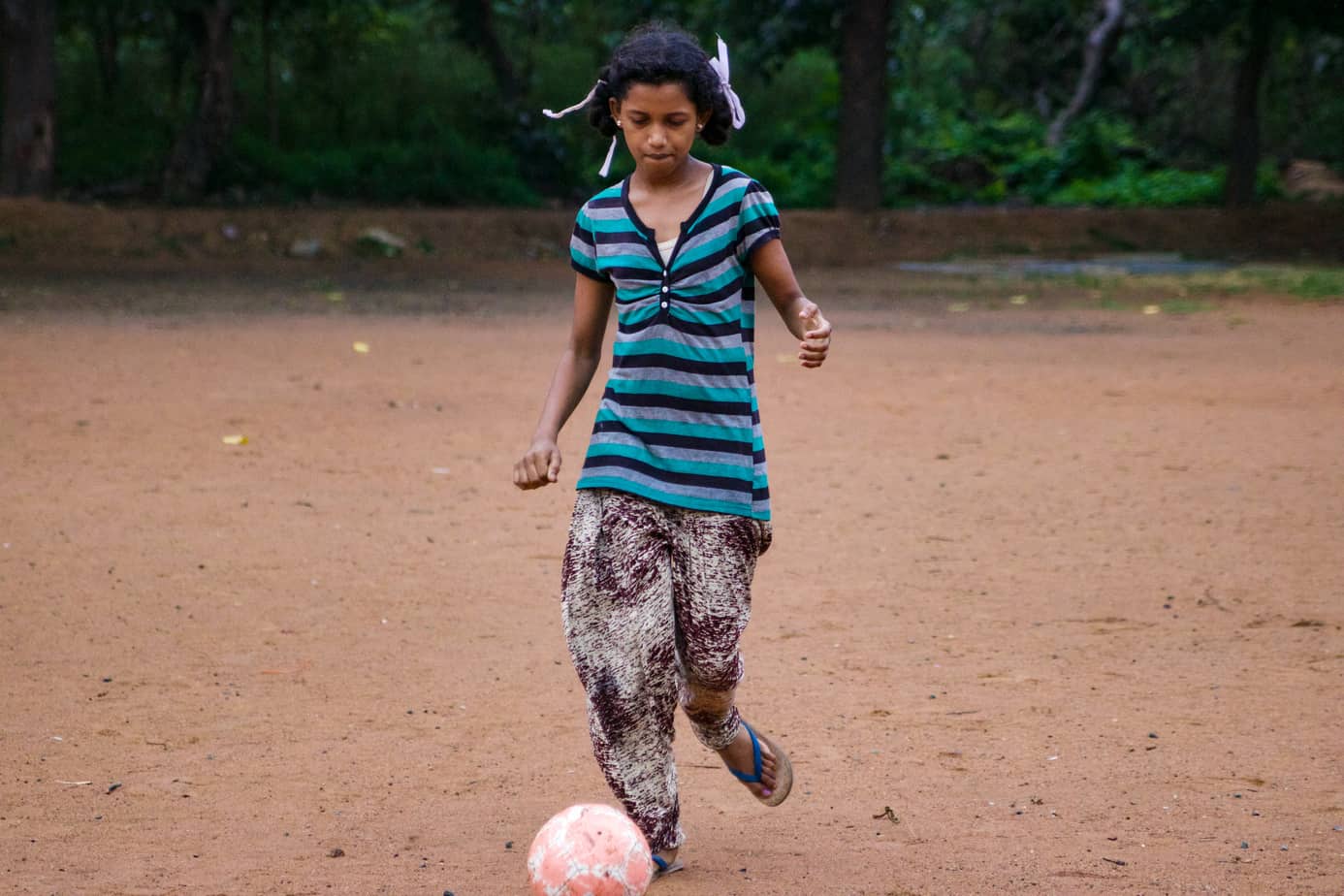
A girl from Maarga training in the morning. Pic: ‘DD’ Grace Madigan
“They wake up at 4-4.30 in the mornings, and it’s almost against all odds. I know things aren’t always working in their favour for them to come here,” Leanne says.
Just two months ago, when she’d started working with the girls, they were extremely self-conscious, she says. “You could always see on their faces – oh I’m making a mistake, I hope she doesn’t get mad. It’s understandable – you have to think about their background, where things like these might become an issue for them,” Leanne says.
Watching the World Cup up close in France
At this year’s Women’s World Cup in France, Festival 19 – organised by the non-profits Street Football World and Sports Dans La Ville – tried to address issue of gender equality, particularly in sport. The initiative brought together disadvantaged youth from 35 countries, to promote gender equality on and off the field. Five Bengaluru girls got the opportunity to attend the festival and witness the World Cup first-hand.
The Bengaluru charitable trust Dream a Dream – which works to empower children from vulnerable backgrounds – had applied for the chance to be one of the delegations to Festival 19. Dream a Dream has an after-school programme to teach life skills to children through art and through sports like football. When the Trust’s application was approved, they put out a call to the young female footballers who were part of their programme.
They asked candidates to explain what they wanted to get out of the experience and how they’d be able to give back to their community. Five girls – Parimala Honappa, Raksha Rameshkumar, Sana Farheen, Divyashree Nanjappa and Shylaja Naganoor – were then selected to form the delegation.
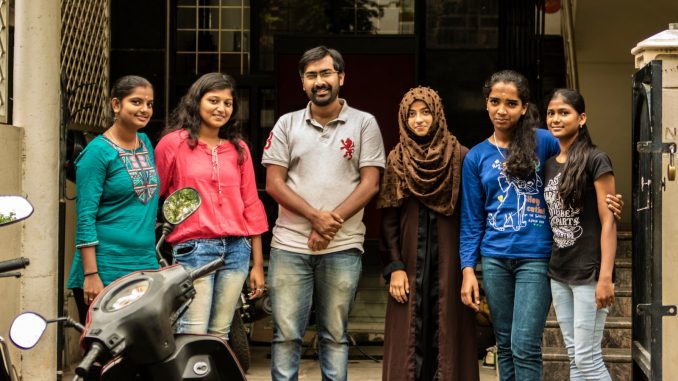
L-R: Parimala Honappa, Raksha Rameshkumar, Anirban Chakraborty – Associate Manager at Dream a Dream, Sana Farheen, Divyashree Nanjappa, Shylaja Naganoor
It was the girls’ first trip outside the country, and one they all agree they won’t forget anytime soon. “We were really lucky to have straight view. We were seated just three rows away from the substitutions, and the stage of FIFA final was very close,” Sana Farheen said.
All the girls had played football before. They agree that the sport has instilled in them confidence and life skills that they could use in their lives. But they are often told that football is only for boys. “We can’t say anything then. But we just want to show them what girls can do,” Sana says. “You can achieve your dreams. There are many people who are against you, but you should not focus just on them.”
All five girls say they want to keep playing football, professionally if they can.
A ‘football non-profit’ that empowers children
PASS Collective, started in 2017, is a self-sustaining football non-profit that teaches skills on and off the pitch to youth from marginalised communities .
The organisation has a for-profit arm that does design work for clients; the earnings are used to fund its non-profit football programme Shining Stars FC. The club has teams of both boys and girls, and participates in local tournaments.
“What we’re trying to address through football is a lack of opportunity,” Shaona Sen, co-founder of PASS, explains. “Because of the circumstances of coming from poverty, these children’s dignity is challenged at an early age, though it is at this age they shape their value systems and belief systems. The way we address this is through football.”
Shaona grew up in Boston with her brother who is the other co-founder of the collective; she’s played football since she was a kid. She wanted to create a club that would have children playing football at a young age and have them play together – two things that aren’t common in youth football in India as it is in the US.
Focusing on excellence both in football and in daily life, PASS has sent many players to college with football scholarships. Four girls from Shining Stars FC have represented Karnataka. “One of them is a tailor’s daughter, she’s a Muslim girl, and they [her parents] had refused to let her play initially,” M Satayanarayan, General Secretary of the Karnataka State Football Association (KSFA), says. “Now she’s got into the state team, and she’s got a seat in college because of football.”
LEOA, Dream a Dream and PASS Collective aren’t just encouraging the growth of women’s football in Bengaluru, they are also empowering girls. They offer opportunities that the generations before these girls missed out on.
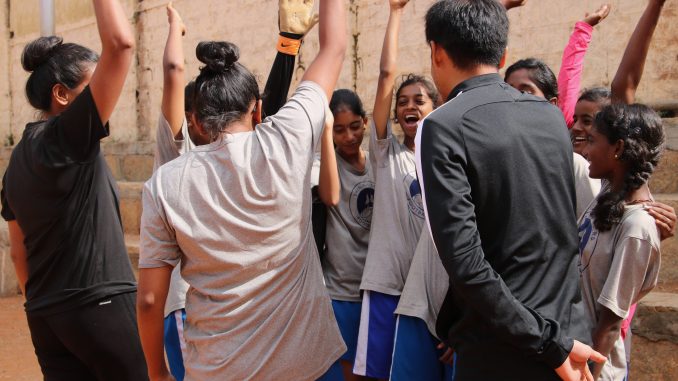
Shining Stars FC has one last huddle before their game against Young Stars FC at the Independence Day Cup. Pic: ‘DD’ Grace Madigan
Making up for lost time
It’s 7.30 am on a Wednesday, and a group of about 10 women run through drills at JBS Field in CV Raman Nagar. Two lads shout out instructions, and tease them with the ease of a coach who’s respected by his players.
Unlike the girls from Maarga, Dream a Dream and Shining Stars FC, these women discovered the beautiful game later in life. Aged between 25 and 40, many of them are mothers who juggle careers.
The women, who train at the Bangalore Football Lead Academy (BFLA), practice together two days a week at JBS. Many of them came to BFLA after becoming a part of Sisters in Sweat (SIS) – a group of women who practice once a week under the direction of Tanvie Hans, a footballer who has played in England, and Swetha Subbia, a personal trainer.
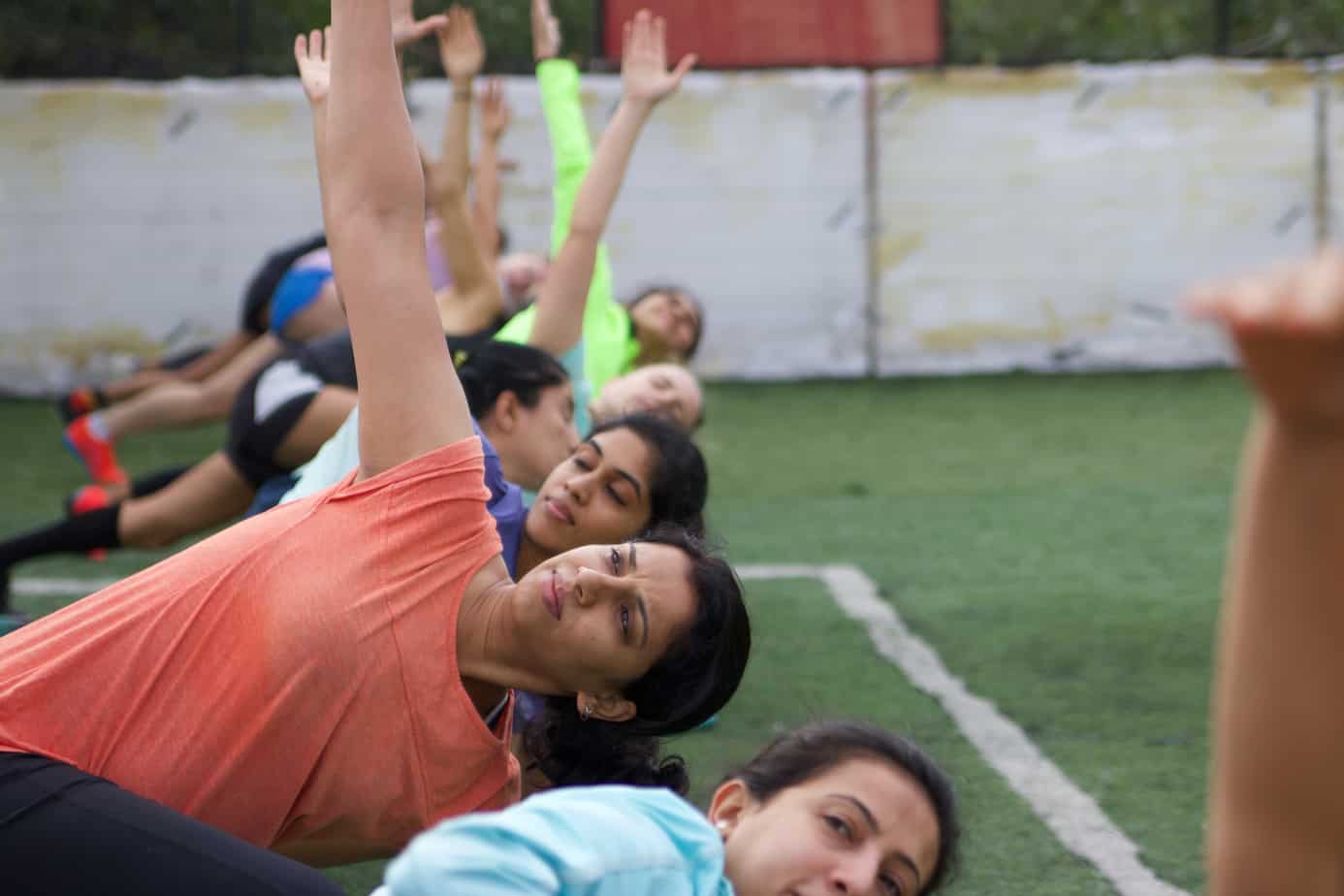
Women at the Sunday training session run by Tanvie Hans and Swetha Subbia. Pic: ‘DD’ Grace Madigan
SIS started two years ago when Jayanti Bhattacharya and a friend met Tanvie and Swetha at a party. They asked Tanvie if she would teach them to play football, and she agreed. In the initial sessions, only a handful of women showed up. But now SIS has a sign-up list every Sunday, and the first 20 who register come train. The SIS WhatsApp group is even larger, with over a hundred women. It is a space where the women share encouragement and accomplishments, as well as opportunities related to the sport.
A few months after SIS formed, Jayanti enlisted Shiva Kumar – a professional footballer who coaches her daughter at BFLA – to coach her and a group of women from SIS who wanted to play even more football.
“I figured they had a lot of patience for our kids, so they would have patience with us,” Jayanti laughs.
The group of women gathered after the day’s session and shared their experience growing up playing sports. They described how there were “boy sports” and “girl sports”, and football was not a “girl sport”. “They had tug-of-war, but not football,” one quips. “That’s not even a real sport!”
Chaitra Prabhakar, 37, explains that she wanted to learn the game after her daughter picked it up. “Tanvie asked me to play defence, and I didn’t even know what she meant,” Chaitra recalls.
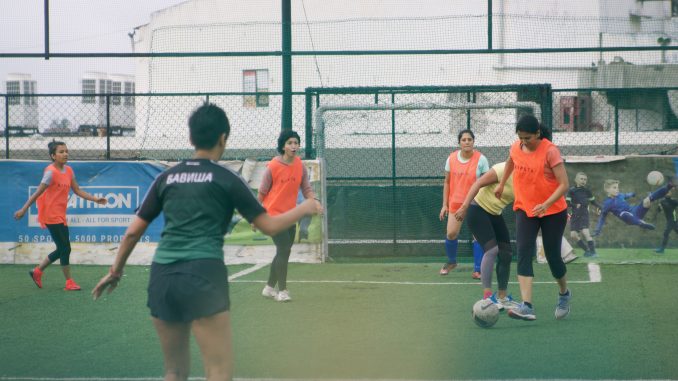
The women of Sisters in Sweat practice football together every Sunday with Tanvie Hans and Swetha Subbia. Pic: ‘DD’ Grace Madigan
Athmika George, another member of both SIS and BFLA, explains that the ability to shed their titles and responsibilities a couple of times a week is freeing. “The days that I play football, I’m on this high when I get back home – it just gives me this sense of fulfilment and satisfaction that I’ve done something,” Prabhakar says. “It’s just been life-changing for me.”
This power that football seems to wield can be seen everywhere in the world. It doesn’t fix things, but allows players to suspend their realities for any given period of time. On the pitch, with the ball at their feet, these women and girls become the deciders of their own destiny.
Young and old, rookies and veterans, more women than ever are finding the game now. For some, football offers a way to exercise, for others it’s an escape or even a ticket to opportunities that weren’t available to them before.
[Part 4 of this series looks at the opportunities and hurdles ahead of professional women footballers in Bengaluru]